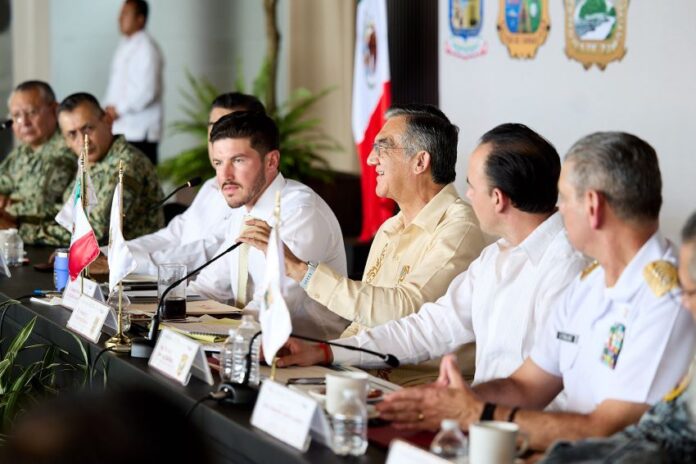Governors of three northeastern states announced they will strengthen joint security efforts — including along the U.S. border — to address increased organized crime and border region insecurity.
After this week’s Third Northeast Region Public Security Reunion in Ciudad Victoria, Tamaulipas, the governors of Tamaulipas, Coahuila and Nuevo León agreed to continue coordinated efforts to improve regional security.

In a Facebook post, Tamaulipas Governor Américo Villarreal thanked his colleagues, saying the three leaders would continue working together for the benefit of their constituents.
“Thanks to this dialogue and institutional coordination, today we can count on strategies to strengthen security along our shared borders as well as along the U.S. border,” he said.
The northeast corridor of Mexico is a hot spot for organized crime activities, including drug trafficking, human trafficking and extortion.
Villarreal said the recent hike in kidnapping and extortion cases is due to an increase in migrant repatriation, creating more potential victims.The three states have had to establish centers to attend to returning migrants who pause along the border before journeying back to their homes.
This is especially true for migrants from other countries who rely heavily on recently-created state institutions as the authorities scramble to provide food, lodging and transportation.
“Fortunately, in-migration has been slowing down,” Villarreal said, “reducing the opportunities for organized crime.”
The three governors agreed to increase security measures in cities along the U.S. border and to reinforce state border operations. They want to heighten police presence on highways leading south and to explore strategies to regulate vehicles, especially U.S.-registered vehicles.
Other activities to be strengthened are intelligence-sharing operations, infrastructure and technology exchange, improvements to communications systems and police training programs.
Interstate cooperation is important to prevent criminals from committing a crime in one state and fleeing to another to avoid capture. Tighter restrictions on the entry of vehicles from the U.S. is critical because U.S.-registered vehicles are increasingly involved in criminal activities.

In a press release, Nuevo León Governor Samuel García said he was pleased with the outcome of the meeting.
“These agreements are very specific and improvements and progress … are quite clear,” he said. “I am pleased that the northeast is seeing regional security fortified while at the same time becoming economically more potent and dynamic.”
Re-establishing the police forces of Tamaulipas
Villarreal said Tamaulipas is taking steps to build municipal police forces in four large cities: Tampico, Altamira, Ciudad Madero and Matamoros.
Most municipal police forces in Tamaulipas were demobilized in 2011-2012 due to high rates of infiltration by organized crime. They were replaced by State Police and State Guard troops, but this left many small cities without any local security forces.
The plan — according to Denisse Romero, a columnist for El Mercurio de Tamaulipas newspaper — is to establish a mixed-operations model wherein the municipal police work in conjunction with the state police.
The only way this will work, she writes, is “with well-trained police, good salaries, sound vetting practices, constant supervision and zero tolerance for corruption.”
Additionally, Romero writes, the plan faces a number of obstacles, including the scarcity of funds, a lack of planning and the need to start from scratch. She also argues that it will be difficult to prevent these forces from being infiltrated by criminal elements.
With reports from El Universal, La Jornada and Excelsior
